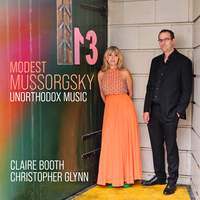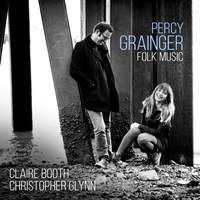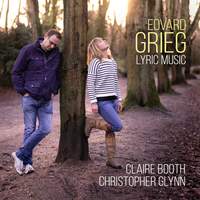Interview,
Claire Booth on Mussorgsky
 One of my personal favourites from October's batch of new releases was Claire Booth and Christopher Glynn's cleverly-conceived, vividly performed Unorthodox Music on Avie, which sees the pair charting a journey from cradle to grave via a brilliantly diverse sequence of Mussorgsky's songs (many of them comparative rarities) and solo piano works.
One of my personal favourites from October's batch of new releases was Claire Booth and Christopher Glynn's cleverly-conceived, vividly performed Unorthodox Music on Avie, which sees the pair charting a journey from cradle to grave via a brilliantly diverse sequence of Mussorgsky's songs (many of them comparative rarities) and solo piano works.
Claire and I spoke over Zoom last month about why so much of Mussorgsky's song output remains relatively neglected on disc and in concert-halls, the pleasures and challenges of getting to grips with the Russian language as a non-native speaker, the composer's gift for depicting strong, realistic female characters in his songs, and how the project follows on from her previous recordings of music by Grieg and Grainger with Glynn...
I don’t think I’d heard many of these songs sung by a female voice before this album dropped…
That was one of the reasons I thought this was a good project to get behind: Galina Vishnevskaya made a great recording of Sunless and Nina Dorliak did the Nursery Songs, but some of the songs here have never been recorded by women (and if they have then it’s buried in the depths of Spotify, which I suppose could well be me in twenty years’ time!). In fact quite a lot have barely been recorded at all, and I get the feeling that even the Russian singers didn’t consider Mussorgsky’s entire output as valuable: we purposefully looked at the whole range of songs, many of which were published in a compilation that’s just called Youthful Years.
Boris Christoff did record all of them, but even that’s a bit of a mixed bag: odd ones were done with orchestra and the others with various different pianists, so you get the feeling that someone just threw it together so that there was a compilation of all his songs out there. Non-Russian singers sometimes do the Nursery Songs, and clearly plenty of people see the worth in being a fantastic interpreter of Songs and Dances of Death - but even so, relatively few singers who aren’t of Russian origin want to get to grips with the language.
And how much of an obstacle did that pose for you as a non-native speaker?
It was actually a perfect lockdown challenge: we knew that we weren’t going to get into a recording studio for six to nine months, so between February and October I had almost weekly sessions with [pianist and language-coach] Lada Valešová. (I hadn’t sung much in Russian before, but I had sung a fair bit in Czech and that’s how we met). Lada’s advice was to listen to Russian radio, because what Christoff does so well is the conversational aspect of the songs. I think if people were describing me as a performer they would say that I have quite a direct style of delivery, so I was really excited to explore the semantics of speaking Russian and see if there was any way that I could get that sort of conviviality with the phrasing.
In songs like ‘Hopak’ or ‘The Drunken Sot’ (an absolute diatribe!), it was hard enough just to learn the words - but you then have to try and get past that and get into a character, and once you are a character you need to understand the ebb and flow of a phrase. It isn’t good enough to split it into quavers: you’ve got to know where the push and pull comes, as we do in our native language. I wouldn’t say my conversational Russian has improved much, but I felt pretty comfortable by the time I got into the studio – I can only hope that what was in my mind bore some resemblance to what came out of my mouth!
How do you think Mussorgsky’s songs compare to Lieder from the same period?
When I started exploring these songs there was a weird sort of déjà vu, because even though I hadn’t heard them before, a lot of them just feel so knowable! But I don’t think any of them sound like they were written in the 1850s: there’s a kind of Wolf-ish quirkiness to some of them, and sometimes a Mahler-y sense of spatial awareness in the harmonic writing. It’s so odd to think that these songs were being written at the same time as Schumann’s, because they certainly don’t sound like Schumann lieder to me. Certainly Mussorgsky’s decision to set amusing, allegorical, slightly jibey texts is worlds away from what Schumann was doing - not that Schumann picked boring texts, but do I think the focus of a lot of German lieder at that time was beauty and reflection whereas a lot of Mussorgsky’s subject-matter is quite pokey and specific, and often from a feminine viewpoint. There’s definitely a sense of him subverting the norm.
Tell me a little more about the strong female characters in these songs…
It’s become a cliché to say ‘a song is a mini-opera’, but with Mussorgsky that really is true: barring cycles like Songs of Travel and Frauenliebe, quite a lot of song-repertoire offers more of a third-person view of nature or emotions, whereas Mussorgsky gives you these very vivid characters to bring to life. It’s interesting that women don’t tend to get much of a look-in in his operas, which are very much centred on male soundscapes and storylines, but his songs are full of awesome female protagonists at very different stages in life - it isn’t just the ‘Happy to be married to you/Sad that you’re dead’ vision of womanhood that you see in something like Schumann’s Frauenliebe. I love that there are songs - plural! - about someone berating their drunken husband: OK, perhaps that plays up to the stereotype of Russian vodka-swilling peasants, but it could just as easily be a British stereotype! I love that immediacy and universality in his writing, and as a non-Russian singer it still speaks to me very strongly.
There will inevitably be some people who prefer to hear a Russian bass sound in these songs, and as a British soprano I’m clearly far removed from that - but I feel I’ve got something to say about this music, and thankfully in Mussorgsky the repertoire itself has something to say to us. The brilliant thing about discovering these songs was they aren’t just beautiful, they’re really incisive - and for me as a woman, it’s so nice to see something that was written by a man during this period which actually resonates and rings so true. Maybe I’ve just sung too many of certain types of songs or I’m just too narrow-minded in the sorts of song-recitals that I go to, but I find that really refreshing: when you discover that a composer absolutely nailed this in the 1850s you can’t help but think ‘Why the hell didn’t we get onto these sooner?’!
In Chris’s programme notes (which deserve to be published on their own, quite frankly) he talks a lot about Mussorgsky’s interpreters: the pianist who used to play a lot of his songs was a woman, and he used to call her ‘my darling little orchestra’. It’s a similar situation with Grieg, actually: looking at his portrait, you might see a bearded old man who you’d expect to be quite conservative in his thoughts and tastes, but because Grieg worked a lot with his wife Nina (who was a fantastic soprano) he really had a window into how his songs would feel in performance. There’s a direct sincerity and a beauty to them that might come across as trite in many people’s hands, but in Grieg it’s just wonderful.
These women were really part of the whole process and product: it’s closer to that collaborative approach that we associate with contemporary music today rather than that image of Schubert singing his own songs in a salon. Mussorgsky wasn’t going to be singing these songs: they were songs for women to get their teeth into and interpret and put out there, and perhaps that’s why there’s something more realistic about it all. With a cycle like Schumann’s Frauenliebe you’re very aware that’s it’s all viewed through the male gaze: as a female interpreter you have to get comfortable with that (and of course one does, because it’s beautiful and we love it!), but it’s lovely to have that sense of abandonment that you get with Grieg and Mussorgsky.
Your previous two recordings with Chris Glynn focused on the music of Grieg and Percy Grainger – do you see any parallels between those two composers and Mussorgsky?
We moved from Grainger to Grieg, and couldn’t find another composer beginning with ’G’ so we skipped to ‘M’! But in all seriousness Chris and I are both attracted by ‘Cinderella’ figures – finding composers that have a strong presence in a certain genre, and then discovering that they have surprising value in a tangential area. When most people think of Grainger they tend to associate him with the Black Dyke Band sound – he was so instrumental in promulgating and promoting the folk-song outside the ‘Baker From Bromley’ approach and into the concert-hall (although it's worth noting that he also appreciated amateur music-making enormously, as do I) that he’s become best-known within that colliery band and orchestral framework. But some of his piano transcriptions are incredibly deft and unexpected, and the best of what Grainger’s got to offer is really insightful.
Grieg fed into that idea of Cinderella composers in a different way, because whilst the Lyric Pieces for piano are really popular, only a fraction of his song-output is familiar to most people – even Haugtussa isn’t that well-known, perhaps because his German-language settings are easier to approach. His songs manifest this extraordinary ability to be sincere yet thought-provoking, and it frustrates me so much that they aren’t heard more often. How many recitals do we need of Schubert lieder? Yes, it’s wonderful, but I do think the ‘could do better’ approach to programming is important. There’s no point in me recording a disc of Schumann songs: there are countless fantastic versions out there already, yet hardly anyone’s bothering with this beautiful music by the likes of Grieg and Mussorgsky.
The programming itself is a little ‘unorthodox’, too, with individual songs excerpted from cycles and solo piano pieces interspersed with the songs: what was the thinking behind that?
We planned the programme so that there is this kind of Frauenliebe-like arc of a life, but intertwining the songs with Chris’s incredible solo playing means that people get a chance to sit back and lean into the different soundworlds rather than thinking ‘This is sixty minutes of syllables that I don’t understand, so I’d better concentrate on the texts and translation’! My favourite arc of an album has to be Mike Skinner’s The Streets, and that’s exactly what I aspire to do with classical song: to offer listeners multiple routes for their journey rather than leaving them stuck in one sound-world for an hour.
Do you have any concerts planned around the release?
We’re at Wigmore Hall in January, but another wonderful arts festival which shall remain nameless told me that they didn’t know how they could fit Mussorgsky into a theme...well, just listen to it! It’s niche repertoire in the sense of being unknown, but I would challenge radio-stations and venues to take a chance on it because I think that if people listen to this stuff they’ll be amazed - not necessarily by my singing (although hopefully that will be a part of it!) but because the music itself is so awesome and well-crafted. I don’t think Mussorgsky is going to stay on his little classical pedestal for long, because there’s something incredibly raw about it: it certainly wasn’t a standing-by-the-piano-with-clasped-hands scenario in the studio, and I hope in live performance it will be similarly active.
Has this project inspired you to add any Russian roles to your opera repertoire?
I’d definitely like to utilise the work that I put into getting to grips with the language. Mussorgsky was writing in the 1800s, but if someone said to me ‘What period do you spend most time in?’ it would be the first half of the twentieth century: Prokofiev, Rimsky-Korsakov, Shostakovich’s Lady Macbeth. I’m not quite sure what it is about that soundworld, but there’s something about the way that these Russian and Eastern European composers look at harmony that really speaks to me, and I love the choices that have been made about the stories that they wanted to tell. So I would definitely hope to do more, and I think this song CD has been a great jumping-off point, not least in registering what sort of protagonists are out there.
Claire Booth (soprano), Christopher Glynn (piano)
Available Formats: CD, MP3, FLAC, Hi-Res FLAC
Claire Booth (soprano), Christopher Glynn (piano)
Available Formats: CD, MP3, FLAC, Hi-Res FLAC
Claire Booth (soprano), Christopher Glynn (piano)
Available Formats: CD, MP3, FLAC, Hi-Res FLAC





